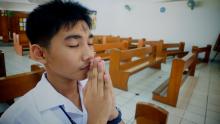Immigration








Today is Ash Wednesday and the beginning of Lent. I grew up in a small evangelical church that only paid attention to the Christian calendar on Christmas and Easter. But over many years now, I have learned to celebrate the richness of all the Christian seasons from my friends in more liturgical traditions and from marrying a Church of England priest!
Lent offers us the much-needed spiritual preparation for Easter. Ash Wednesday is the place to begin; and that often includes fasting — in different ways and traditions. At Sojourners, we usually have a big staff pancake breakfast on Shrove Tuesday morning, the day before Ash Wednesday. But today, many of us are fasting.
Ash Wednesday doesn’t begin a hunger strike, but rather a season of self-examination, spiritual reflection, repentance, sacrifice, and focused prayer. Lent is a time to examine our hearts and lives, to acknowledge our sins, to look for the ways we are not choosing the gospel or welcoming those whom Jesus calls us to.

The Supreme Court on Monday declined to hear an appeal from a family seeking asylum in the United States because home schooling is not allowed in their native Germany.
The case involves Uwe and Hannelore Romeike, Christians who believe German schools would have a bad influence on their six children. The family’s case became a rallying point for many American Christians.
As is their custom, the justices on the high court declined to give a reason for not hearing the case.
Michael Farris, chairman of the Home School Legal Defense Association that represents the family, said the group would pursue legislation in Congress to allow the family to stay. But the Romeikes will likely face deportation.










